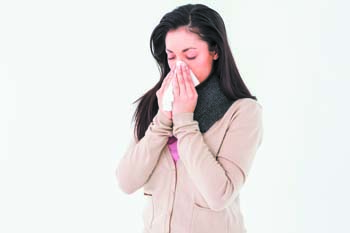This the season for allergic reactions and asthma triggers. Here’s how to steer clear of all those irritants.
Allergies and asthma don’t take a winter holiday. Even during the cold months, common allergens are all around. And worse, allergies and asthma can be exacerbated by a holiday season full of alcohol, unhealthy foods, and poor sleep habits. Your immune system is run-down. When you’re tired, your immune system is tired, and you’re more sensitive to allergens
Allergens Don’t Take a Vacation
During the colder months, when snow and rain cloud the air, it can be hard to imagine that common outdoor allergens like pollen could be swirling around. And for people living in snowy environments, springtime hay fever—the generic term for a collection of symptoms like sinus irritation, itchy eyes, and congestion caused by allergens known as allergic rhinitis—most likely won’t be a worry, says Wood.
However, for people living in warmer climates, there’s a price to pay for nicer weather.
Largely, if things are in bloom and trees retain their leaves, there’s a chance of pollen-induced allergies. But with many people heading indoor for winter festivities, exposure to indoor allergens increases. For asthmatics, sensitive to common indoor allergens, the winter months unfortunately don’t offer seasonal relief.
In addition to common allergens, Christmas trees, fireplaces, and poor diet and sleep habits can contribute to asthma and allergies. While the pine scent of a Christmas tree is certainly evocative of the season, it may not be the best idea for people who are particularly sensitive. Ditto with fireplaces, which release smoke and pollutants into the air.
If possible, wash the tree outside and let it dry completely before bringing it inside. That tactic seems to help a majority of patients who have pollen allergies, Wood says. And make sure fireplaces are well ventilated.
And when central heating is turned on and circulating air throughout a house, it’s also circulating things like dust, dust mites, and pet dander. If you’re particularly sensitive to dust or dander-induced asthma attacks, Wood recommends switching off the central heating and trying space heaters as an alternative, which won’t circulate allergens along with the hot air.















More Stories
PIMA COUNTY HOSTS FEMA HIGH-CAPACITY COVID TESTING CENTER AT PCC WEST CAMPUS
Editor letter
This past month of April, The U.S. Census Bureau released congressional apportionment and population counts for every state.
Tucson City court closed this Friday and, on the holidays
Pima County opens another round of PPE Business Assistance
Sunnyside Foundation provides resources to enhance and accelerate the educational